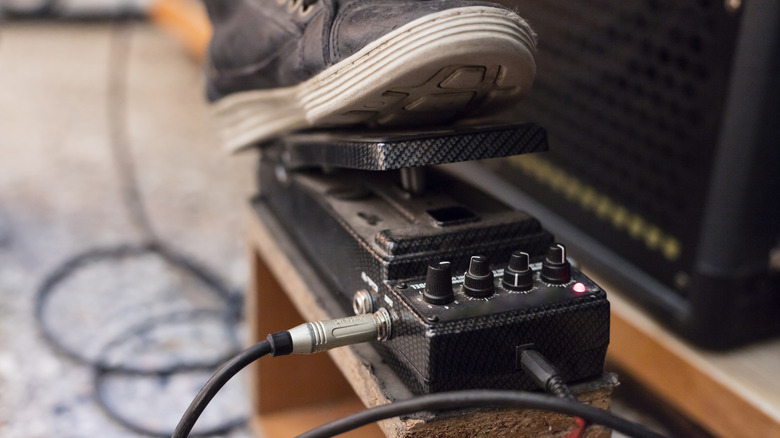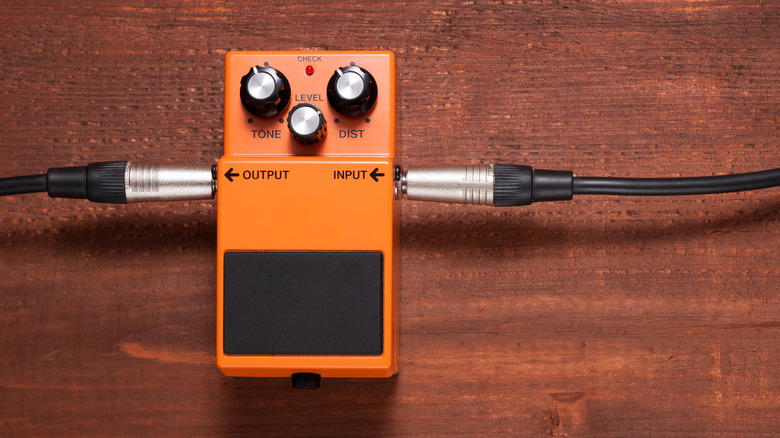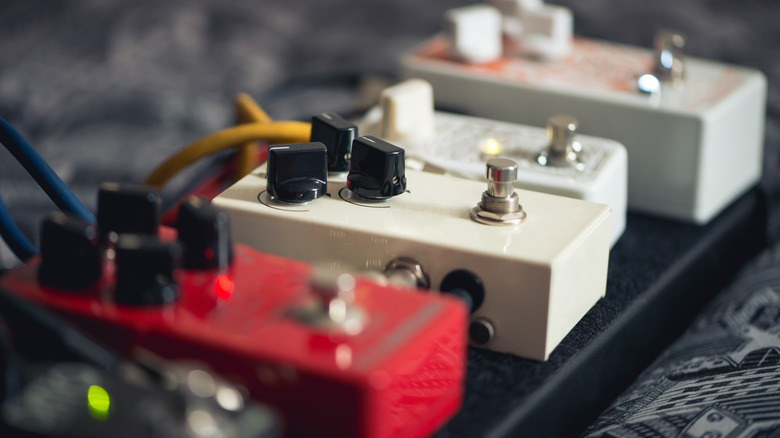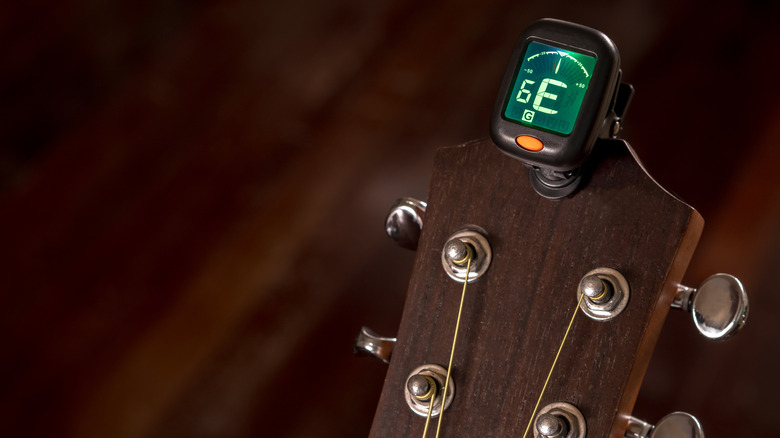5 Of The Most Popular High-Tech Guitar Tuners, Ranked By Price
Whether clipped to your headstock or sitting on your pedalboard, a digital tuner is a convenience for any guitarist, and a necessity for gigging musicians. You very well may have perfect pitch and prefer tuning with a tuning fork and your ear, but are you going to do that onstage at a noisy bar, club, or theater? For 99.9 percent of us, the answer is no. Even classical musicians have accepted that digital tuning is a fast and dead-accurate way of tuning any instrument.
It does not take an expensive tuner to get the speed and accuracy that make them so worthwhile. As you go up in the price range, you tend to get more features and more rugged build quality, rather than more accurate tuning. At almost any price point, there is a tuner that has made a name for itself as a road-worthy tool. Let's look at some of the most popular guitar tuners, from thrifty to nifty.
Ernie Ball VPJR Tuner Volume Pedal: $219.99
We've seen standalone tuner pedals, tuners built into multi-FX pedals, and clip-on tuners, but the Ernie Ball VPJR Tuner Volume Pedal is a step into the Twilight Zone. It's as if a tuner and a volume pedal were involved in a strange electronic experiment that went incredibly well. With the VPJR, the tuner isn't next to the volume pedal, or above or below it. It's part of the pedal itself, set into the treadle's surface so your foot doesn't really contact the screen when you use the volume pedal. The display is innovative in that it displays what setting the volume pedal is on (displayed as 1 to 10) unless it's at zero, at which point it displays the tuner. This spares your audience the sound of you tuning up, since you have to turn your volume to zero to use the tuner.
The screen is bright and large. The numerical display of where your volume is at is a feature no other volume pedal has, which allows you to set a "rhythm" volume level and then come back to it accurately after a solo. And the tuning is fast and accurate — the reference pitch can be adjusted for bands that tune down. Even better, the Ernie Ball VPJR includes a circuit buffer that gives you a hand with long signal chains like you find on pedalboards. And all this comes in a sturdy aluminum chassis with just the right amount of heft.
BOSS TU-3, $99.99
BOSS pedals are the gold standard of stomp boxes. Their DS-1 distortion pedal, CE-2 chorus, and GE-7 equalizer pedals are in the effects Hall of Fame (or would be, if there were such a thing). The TU-3 tuner maintains the standard, providing a readout with variable brightness for day or night gigs and tunings for any kind of guitar you have, up to and including seven-string guitars and six-string basses. For bands that like to tune down, the TU-3's Flat-Tuning mode can go down six semi-tones. And when you turn the tuner on, it automatically mutes your signal chain, because no one wants to hear you tune up.
A bonus feature on the TU-3 is its ability to act as a power hub for up to seven other BOSS pedals. Instead of a separate power cord for each pedal, you can daisy-chain from the TU-3, simplifying your cabling at least somewhat. And all this comes in the classic brick-shaped BOSS pedal form factor that is built like the proverbial tank and made to last. It usually retails for $99.99. (There is also a compact version of the TU-3 that comes without the activation switch and is always on. It sells for the same price.)
TC Electronic PolyTune 3, $99.00
TC Electronic is famous for its effects pedals. From the Hall of Fame Reverb and Flashback Delay pedals to an advanced Plethora line of multi-effects, TC Electronic has always been on the cutting edge of what can be done with a guitar signal. The PolyTune line of tuners by TC Electronic is remarkable for one feature that nobody else has: It can, quickly and accurately, display the tuning of all six of a guitar's strings at once. You just strum all six strings, and adjust the out-of-tune strings.
The PolyTune 3 improves on its predecessor by allowing for polyphonic, chromatic, and other altered tunings by employing TC Electronic's BONAFIDE Buffer that combats signal loss over long cable runs. It also increases the accuracy of its display, along with adding an ambient light sensor to adjust the brightness of the display to your situation. Advanced and very well built, the PolyTune 3 is well worth its usual price of $99.00.
Korg Pitchblack X Mini, $89.99
Today, most guitarists who use multiple pedals have them neatly arranged and optimally cabled using a pedalboard. On a modern pedalboard, real estate is at a premium. For some pedal-happy guitarists, each pedal they add means a pedal must go, leading to some truly heartbreaking compromises.
This is what led to the development of mini pedals. By reducing the chassis to the smallest box that will hold the necessary circuit board, guitarists could indulge their wildest pedal dreams or, alternately, keep a basic signal chain on a board that would fit in a backpack. This is what inspired Korg to design the Pitchblack X Mini tuner. It's got a bright, adjustable display that doesn't jump around a lot, locking in on your note quickly and accurately. It offers multiple display modes (strobe, mirror, etc.). It can even be battery-powered, something many mini-pedals do not allow for in order to keep the chassis small.
And as part of the new X version of the Pitchblack tuner, the Pitchblack X Mini features the Ultra Buffer that boosts signals to account for long guitar cables and even longer effects chains.
TC Electronic PolyTune Clip, $49.00
Clip-on tuners are excellent. They are easy to use, putting the display where it can be easily read. And even better when you're in a band, they can easily be lent to another musician who forgot to bring one, and it will work on whatever stringed instrument the other musician is playing — acoustic or electric. If you could use a clip-on tuner that speeded up the process by showing you all your strings' tunings at once, wouldn't that be great?
And now you can. TC Electronics, maker of world-renowned pedals including the revolutionary PolyTune series, has ported the multi-string technology of the PolyTune to a clip-on model, the PolyTune Clip. With the PolyTune Clip, you can tune three ways: Polyphonic mode, regular Chromatic mode, or you can use the built-in strobe tuner for incredible accuracy (even more accurate than the full-sized PolyTune pedals). And like most TC Electronics products, the tuner is well-built and easy on the eye, with a display that is both bright and intuitive to understand, even in Polyphonic mode.





